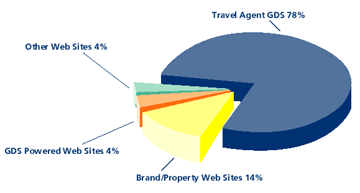 | 
IN THIS ISSUE:
Spending Ad Dollars Wisely
First Quarter
GDS Hotel Bookings
Choice Hotels Partners with TravelCLICK
|
|
 |
|
|
| |
Summer 2002
|
 Manage Manage
E-Commerce
to Your Advantage
Call centers have quieted down as hotel e-commerce has turned the corner.
Today, more than half of all transient hotel guests make their bookings
electronically, either through travel agents or consumer Web sites. And it's
paying off.
Hotel reservations made by consumers over the Internet comprise a $3 to $4 billion
marketplace. Almost one billion of this revenue is powered by the GDS, which
continues to be the king of e-commerce, generating $15 billion in hotel bookings.
These electronic channels are also critical sources of information for hotel guests.
While only three to 10 percent of hotel bookings are made via the Internet, 20 to 50
percent of all transient hotel guests actively research their travel online. Another 20 to 30 percent of all transient hotel guests continue to use travel agents and the GDS to gather
information about hotels. Add it up and one can see that for most properties,
the majority of transient travelers rely on electronic channels to make their hotel choices.
With e-commerce channels emerging to dominate hotel distribution, hoteliers need
to ensure that they are maximizing performance. TravelCLICK provides two strategies
for success in the growing electronic marketplace:
1. Continue Leveraging Both GDS and Consumer
Online Marketplaces Some hoteliers see 50% annual growth of Internet hotel
bookings and conclude that this increase is coming at the expense of GDS. It's not. The true shift in consumer behavior is away from the phone, as chain Web sites are replacing voice channels. Since many consumer Web sites continue to receive pricing, availability and content from the GDS, it would be foolish to drop marketing initiatives for the GDS.
It is true that growth in GDS hotel bookings will be affected by recent zero commission initiatives by the airlines, but most successful travel agents have changed their business model so that fees for service are passed on to corporations or consumers. Travel Agents are now more aggressive in getting hotel bookings to overcome the loss in airline commissions.
Even if one anticipates that the Internet will eventually be the dominant booking channel, at the current growth rates, it will take four to five years to equal the current
GDS marketplace.
2. Place All Room Inventory on the Electronic Shelves
In the late 90s, hoteliers moved distressed inventory quickly through wholesalers, who distributed net rates to Web sites. Since this time period, the consumer online marketplace has matured. Today, the Internet is used by all segments of
travelers. The view that consumers who research and book
travel online are just looking for a 'deal' is not only extremely outdated, but very costly.
Hotels that maximize their sales of retail inventory through the GDS and consumer Web sites such as Travelocity are the real winners in electronic distribution. These hotels benefit from the ability to control rates and availability, and therefore enjoy higher yields than hotels that rely heavily on net rate intermediaries for electronic channels. Both GDS and consumer online channels provide the hospitality industry with the power to sell rooms at retail prices, yet respond quickly to changes in the marketplace.
By leveraging electronic distribution on the Internet and via GDS, and placing all room inventory on the electronic shelves, hoteliers can manage e-commerce to their advantage and win more business at higher yields.
$18 Billion Hotel Marketplace
Room Nights Distributed Electronically in 2001

|
Marriott Optimizes Sales Performance
with TravelCLICK's E-Marketing Tools
"We are gratified that a company with the stature and reputation of Marriott International has chosen to offer TravelCLICK products chain-wide to its 2,400 hotels," announced Ray Cohen, president and co-CEO, TravelCLICK.
TravelCLICK's products and local consultants will help Marriott properties raise their profiles on the electronic shelves and boost revenues.
"TravelCLICK will better equip our hotels to plan and successfully execute strategies that improve performance within their market and across electronic sales channels," said Shafiq Khan, vice president of E-commerce, Marriott International, Inc. "Optimizing sales performance in these rapidly growing electronic channels is one of the keys to our future success."
Celebrating its 75th anniversary this year, Marriott International operates and
franchises hotels under the Marriott, JW Marriott, The Ritz-Carlton, Renaissance, Residence Inn, Courtyard, TownePlace Suites, Fairfield Inn, SpringHill Suites and Ramada International brand names.
|
Pages 1 | 2 | 3
|
 |
|  |
